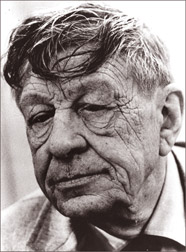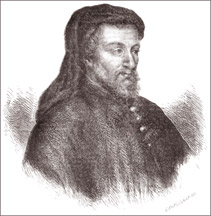Taking stock of ‘The ceaft so long to lerne’
 So far in this series we have considered nearly twenty “great” poets
from Chaucer of the 14th century to Auden of the 20th. It seems an
opportune moment to take stock of our survey, but this does not mean
that the series is at an end. For one thing, a reader of this column has
requested that some women poets be included, since those featured so far
have only been men. This certainly merits consideration, although the
omission of women has by no means been intentional. So far in this series we have considered nearly twenty “great” poets
from Chaucer of the 14th century to Auden of the 20th. It seems an
opportune moment to take stock of our survey, but this does not mean
that the series is at an end. For one thing, a reader of this column has
requested that some women poets be included, since those featured so far
have only been men. This certainly merits consideration, although the
omission of women has by no means been intentional.
Perhaps the first point worth making is that all the poets surveyed,
whether or not they were regarded as great in their time, are regarded
as such today. Hopkins is an obvious example as he was unknown in his
time. Although they are dead, their poetry is alive to us because it
continues to appeal to us and edify us. And their appeal varies in
accordance with their period, subject matter, style and personality.
 |
|
W H Auden |
 |
|
Geoffrey
Chaucer |
Furthermore, even though the great poets are uniquely themselves and
never derivative, they are all part of the great poetic tradition that
we have traced over the centuries. They have learnt from that tradition
as well as enriched it and adjusted its course. In his landmark essay,
“Tradition and the Individual Talent”, TS Eliot said, “No poet, no
artist of any art, has his complete meaning alone. His significance, his
appreciation, is the appreciation of his relation to the dead poets and
artists....the past should be altered by the present as much as the
present is directed by the past.” What the poet learns from his
predecessors by way of style, form and subject, he adapts to his own
sensibility. Thus Marvell learnt from Donne but was quite different from
him, similarly Johnson from Pope, the Romantics from Milton and Eliot
from the Metaphysicals. What this means is that the achievement of the
great poet owes much to the great tradition even as his reshaping of
that tradition enables it to remain great.
The fact that this tradition of English poetry, (by which we always
mean poetry in English), lives on even after the poets that determined
it are dead, means that the poets of the present are also part of it.
This is true whether they are established or aspiring poets and to
whatever country or culture they may belong. The only conditions are
that they should be writing in English and that they should be serious
poets, wanting their poetry to have a lasting appeal. Such poets of the
present cannot afford to ignore the tradition, lest they deprive
themselves of learning such techniques of poetic thinking and
communication as could prove invaluable in the development of their own
sensibility and style. In the article on Auden, we saw how the latter
learnt from Old English poetry, Blake, Yeats and Eliot in developing his
own unique poetic personality and expression.
Nor do the poets of the present, including those of Sri Lanka, need
to fear that the influence of the English poetic tradition would tend to
Anglicize or westernize or otherwise condition their poetic
consciousness. Great poetry transcends its national or cultural origins,
even though these may serve to provide it with “a local habitation and a
name”, since it deals essentially with the “things unseen”, affording
insights into the meaning of life that are ultimately universal and
impersonal. For the great poet, as Shelley insisted in his “Defence of
Poetry”, is primarily a philosopher. Yeats’ father, in fact, told his
son that although he had become a poet, he was really meant to be a
philosopher. DH Lawrence wrote that “the essential quality of poetry is
that it makes a new effort of attention, and ‘discovers’ a new world
within the known world.” Thus Blake enabled us “to see a world in a
grain of sand and heaven in a wild flower”; Wordsworth presented Nature
to us as a “presence that disturbs with the joy of elevated thoughts”,
causing us to “hear oftentimes the still, sad music of humanity”;
Lawrence showed us what it meant to be “man alive” and become aware of
the “strange and for ever surging chaos within which man, and the
animals, and the flowers, all live.”; while Eliot acquainted us
unforgettably with “the boredom, and the horror, and the glory.” A poet
of the present can only benefit from learning of these poetic visions of
life as he strives to form his own personal vision.
Yet, the influence of poetry is greater than that of philosophy. This
is because poetry affects not only the mind of man but his heart, the
seat of his motivation. A true poet can speak from his own heart to the
heart of his audience because uses the language of the heart. He knows
how to use words, to choose them and arrange them in such a way as to
unleash their emotive power beyond their purely descriptive function.
And this is where poetic technique comes in. The poet is a “maker”, his
art depends on his craft. “Ars longa est”- art lives long, because it is
based on a craft that is long in the learning. These words of Chaucer
were meant to describe the art of courtly love, but they also seem
appropriately to express the laborious process and the fearful joy
involved in mastering poetic technique because of its sheer elusiveness:
“The lyf so short, the craft so long to lerne,
Th’assay so hard, so sharp the conquerynge,
The dredful joye, alwey that slit so yerne (that passes so quickly)
Al this mene I by Love (read Poetry!), that my felynge
Astonyeth (is astonished) with his wonderful werkynge..”
Poetic craftsmanship is not just a matter of verse form, whether
regular or free, it is a matter of developing the idiom appropriate to
the expression and communication of the poet’s particular sensibility.
The great poets are those who have not only altered poetic sensibility
in accordance with their own personality and the time in which they
lived, but have altered poetic expression and communication to suit
their personality and their time. We have seen how Wordsworth did this
to usher in the Romantic period and Eliot to usher in the Modern age.
Long before them, Chaucer, the father of English poetry, had developed a
new poetic idiom for his successors to work with, and Shakespeare, its
greatest master, had developed the language of poetry to communicate a
hitherto unexpressed range of thought and feeling.
Finally, a word about the Imagination. This must be distinguished, as
Coleridge warned us, from the Fancy, which is an inventive rather than a
genuinely creative faculty, a matter of the head rather than of the
heart It is the poetic imagination alone that can transform, in Eliot’s
words, the personal and the private agonies of the poet into something
rich and strange, something universal and impersonal. To do this, the
imagination needs two ingredients. One is craftsmanship, as we have
already seen. The other is honesty to one’s experience. The two are, in
fact, mutually dependent. The “terrifying honesty”, for instance, of
Blake comes through because of his great technical accomplishment.
We have seen how the great poets have been true to their experience,
writing from the heart without having any, as Keats put it, “palpable
design upon the reader.”
It is when a poet writes from the intensity of his personal
experience that his poetry assumes a universal or symbolic or,
paradoxically, an impersonal quality. Yeats’ “Prayer for my Daughter” is
a good example. So is Frost’s little quatrain “Devotion” Provided, of
course, as in these cases, that the technique is commensurate with the
experience. In that case, Keats’ requirement that “poetry come naturally
as the leaves to the tree”” will be met. For, as Pope aptly put it,
“True ease in writing comes from art, not chance, As those move easiest
who have learn’d to dance.”
|



